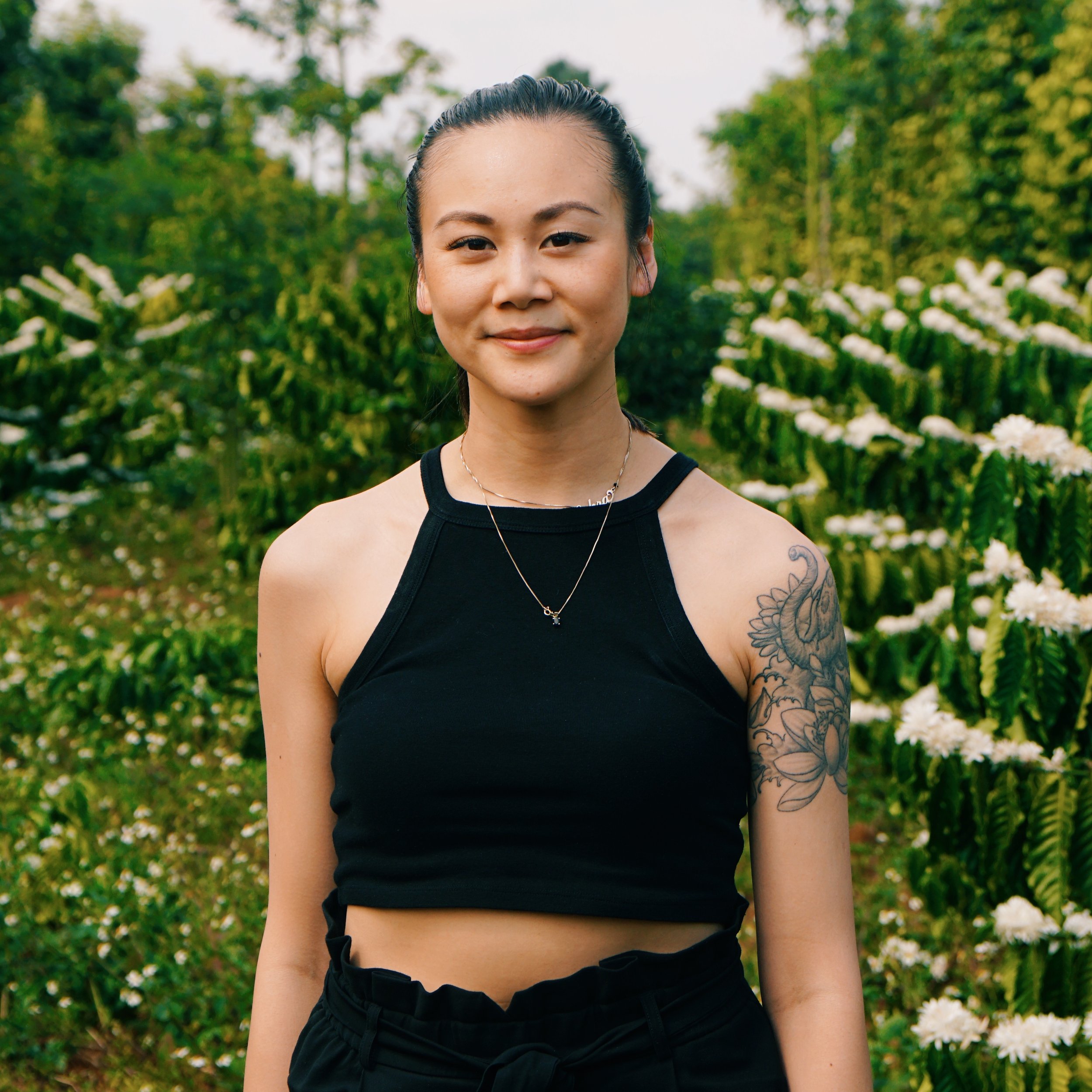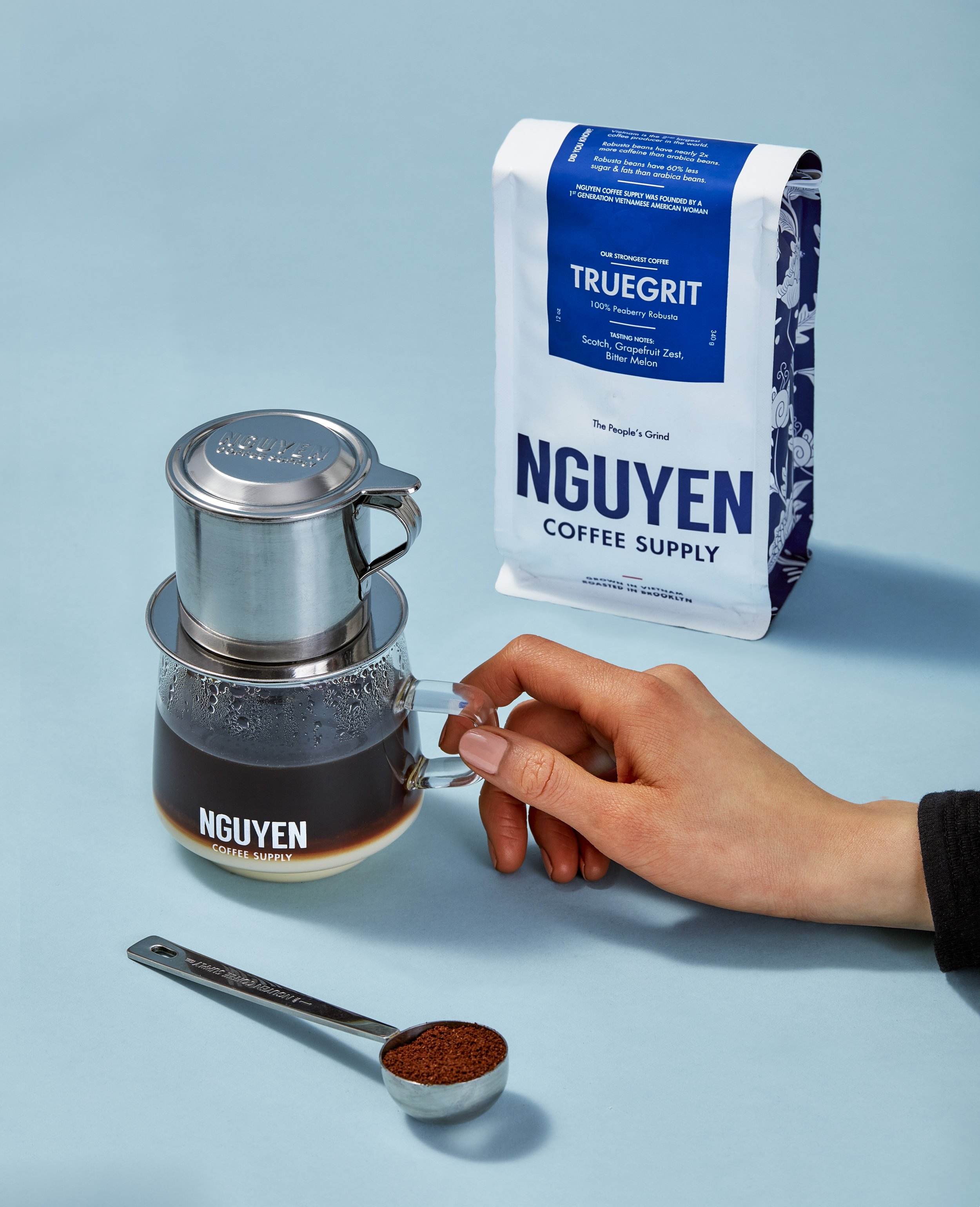The Quality Makers: Sahra Nguyen of Nguyen Coffee Supply
Photo: Founder Sahra Nguyen
Our team is dedicated to finding and telling you more about the web’s best products. If you purchase through our links, we may receive a commission. Our editorial team is independent and only endorses products we believe in.
Welcome to The Quality Makers, an interview series highlighting pioneers in the direct-to-consumer space. Join us as we get an inside look at the world of digital shopping through the eyes of the individuals shaping it…
Sahra Nguyen is a first generation Vietnamese-American, born and raised in Boston, and now based in Brooklyn, New York. She’s also the founder, CEO and head roaster of Nguyen Coffee Supply: America's first specialty Vietnamese coffee importer and roaster, meaning they import coffee beans through direct trade relationships across Vietnam, and then roast them right in Brooklyn.
Nguyen Coffee Supply’s main product offerings include The Original Vietnamese Coffee Trio, the Dark Roast Coffee Trio, and a Phin Drip Coffee Set, centered around the traditional Phin Filter, which is a fundamental marker of Vietnamese coffee culture. Nguyen Coffee Supply also recently launched a ready to drink cold brew line, which includes the following flavors: Classic Black, Coconut and Condensed Milk. This cold brew line is the first of its kind in the United States because it's made with 100% Vietnamese Robusta coffee. Below, Sahra shares personal anecdotes and wise words on the coffee industry and her unique positioning within it.
Photo: Nguyen Coffee Supply’s Condensed Milk Cold Brew
What led you to start a coffee company?
SN: “Before starting the company, I was a full time freelancer in NYC working in journalism and documentary filmmaking. So I spent a lot of time in coffee shops and noticed around 2016 that Vietnamese iced coffee was becoming super trendy. It reminded me a lot of when matcha, chai or boba tea first started blowing up. There’s this macro trend of Asian beverage culture in America – even more broadly, of Asian pop and food culture – and if felt like Vietnamese coffee was becoming part of that. However, every time I'd order Vietnamese iced coffee, it never tasted like anything I’d had in Vietnam.
I’d ask the barista how they made the iced coffee, and they’d tell me it’s their house Ethiopian or a Brazilian blend, with sweetened, condensed milk added to it. But that doesn't work because the coffee beans they were using weren’t from the country of Vietnam, and the variety was Arabica, which tends to be much more fruit forward or citrusy and doesn't pair well with milk. I found this to be problematic on so many levels: they're rendering the actual farmers in Vietnam invisible, they’re miseducating/misleading consumers by not calling the product what it is, and lastly, they’re practicing cultural appropriation. This is a perfect example of people wanting to profit off the culture cachet of Vietnamese coffee, but yet the producers of that product and culture are not benefiting from the transaction.
So I started wondering: why don't they just use real Vietnamese coffee beans? I was pretty shocked that I couldn't actually find a single coffee shop or company that sold fresh roasted Vietnamese coffee beans anywhere in the market. And what blew my mind even further is that I found out Vietnam is the second largest coffee producer in the world.”
Photo: Sahra Nguyen in Coffee Farms in Vietnam
Why isn't Vietnam part of the new wave coffee conversation?
SN: “What I realized is that this is a lack of transparency and a representation issue. Vietnam has essentially been rendered invisible in the coffee industry, very similarly to the way in which I feel invisible as a first-generation, Asian-American person in the American media. So I felt the need to connect the dots and unlock the transparency in bringing visibility to something that's already in existence. I wanted to help build a bridge for people to engage with the industry and the culture in a more authentic way.
So in 2015, I went to visit my family in Vietnam. I asked my relatives if they knew anyone who works in the coffee industry, and they did. That was the very beginning of me establishing my direct trade relationships. I went to visit coffee farms in Da Lat, Vietnam, and got to understand their challenges, their passions, their dreams. We have a very personal relationship with the farmers. We visit the farms, we collaborate, we exchange and educate each other on how to improve the quality of the product, because they want to enter the American market. What I heard is that Vietnam, historically, really has been pushed into the cheap, instant coffee market for a lot of political reasons. Essentially, they feel really stuck because the rest of the industry has boxed Vietnam into this segment of: ‘you only make cheap coffee that’s inferior to Arabica coffee.’
There’s this history of a truly collective investment within the industry, to make better quality coffee so you can sell it at a better price, which requires education and commitment to each other. But that investment completely stopped when it arrived in Asia, and I feel like that was a really inconsistent application of values. Imagine how much of the industry we can impact if we simply worked on making Vietnamese coffee a little bit better. There are folks in Vietnam who have been spending years improving their production of specialty coffee, then they try to sell it to the Green Market, but no one will believe them so they end up losing money to a commodity market. I learned a lot about this cycle of poverty and exploitation, and wanted to do everything in my power to break it.”
Photo: Nguyen Coffee Supply’s Phin Filter Set
What would you say your overall mission at Nguyen Coffee Supply is?
SN: “A big part of our mission is to provide visibility and authentic representation, but also to help the industry challenge these dated and elitist narratives of superiority/inferiority around coffee varieties. Everywhere you look, it'll say: Arabica is superior, Robust is inferior, which is like saying lemons are superior to limes. Vietnam is also the number one producer of Robusta beans, which are also grown in India, in the Congo, in Brazil… basically everywhere outside of the West. Our goal is to expose these elitist frameworks by showing that you’re actually trapping entire segments of the global coffee population into exploitation. One of the ways in which we do this is by elevating Robusta coffee beans as a variety. Doing that unlocks a pathway for Robusta farmers around the world, because now that variety is being appreciated for what it has to offer uniquely, versus being automatically deemed as inferior.
We aim to change the future of coffee and expand the conversation by carving out a space for underappreciated and marginalized varieties of coffee like Robusta, to make the industry more inclusive and equitable. Since then, we've been leading the rise of Robusta. Last year, the New York Times published its food predictions of 2022 and wrote about Robusta’s rise to dominance within coffee culture. Summer of 2022, we became the first coffee company to sell transparently labeled Robusta coffee beans in Whole Foods Market. It takes a village but slowly we’re revolutionizing the market.”
What did coffee culture look like in your upbringing?
SN: “My parents worked a lot because they were refugees from the Vietnam War. They escaped the country on a boat in the late 70s. They were at sea for two months and eventually ended up in a refugee camp in Hong Kong. They stayed there for a couple years and then they got sponsored to come to Boston, where they settled and had me. So when they came here, they didn't have anyone, they didn't know English, they didn't even know each other yet – they actually met in Boston. My mom’s from the south of Vietnam and my Dad is from the North. Those areas were at war, so there was some tension at first, but eventually my dad won my mom over.
They worked a lot. My mom worked in a laundromat as a seamstress. My dad painted houses and did construction. I remember them making a pot of drip coffee in the mornings. As I got a bit older, they started buying coffee because they had the luxury. I remember Dunkin Donuts became such a big part of their daily ritual. But my real entry into Vietnamese coffee was when I visited Vietnam. I remember all my aunts, uncles and my grandfather would have a Phin drip coffee over a glass – slowly dripping coffee that they’d drink all day long. They’d be hanging out and smoking and chatting and drinking coffee and I just remember it smelled so good.”
Sahra Nguyen Childhood Photo
What do you hope people will take away from engaging with Nguyen Coffee Supply?
SN: “For starters, I really hope that people enjoy our coffee. We work really hard to produce coffee products that we believe are delicious. We hope people are able to find a comforting daily ritual around slowing down and enjoying a drip coffee in your cup. And most importantly, I hope people get excited about trying something new, and that that experience allows them to expand their perspective on what coffee can be, on what coffee can taste like, and maybe it’ll even encourage them to engage with other cultures around the world more frequently. Sometimes what's right in front of us, like on the supermarket shelves, can be really limiting. Especially when the people in the positions of influence and decision making all come from the same perspective and experience. We aim to challenge that and I hope our consumers get inspired to be open minded.
The world's biggest coffee companies today are rooted in a North American or Eurocentric story and culture, even though coffee is grown in South America, Central America, Africa and Asia. So why don't we have a global brand that's globally recognized and appreciated, as well as rooted in the origin and in the culture of coffee? It's a huge disconnect, and a big missed opportunity, to really uplift the creators of this product at origin and to bring more cultural appreciation to the rest of the world. I hope to become one of the most, if not the most, influential coffee company in the world. And it’s conversations like this and folks like you that’ll make it happen.”
Want to be a part of Nguyen Coffee Supply’s journey by trying out some authentic, Vietnamese coffee? Check them out here!




